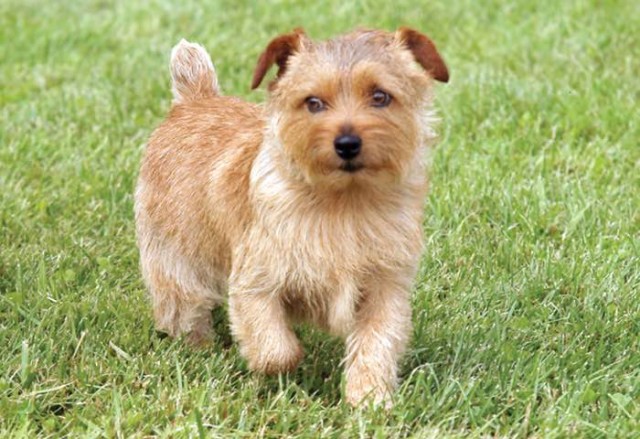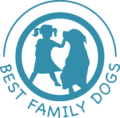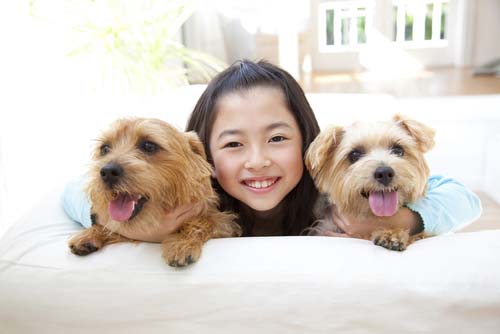Norfolk Stats
Working Group: Toy
WEight: 11-12 pounds (5 to 6 kilograms)
Height: 23-26cm (9 to 10 inches)
Lifespan: 12-15 Years
Norfolk Terriers have a reputation for the gentlest temperament of dogs in the terrier group. They get along well with children in play, but must always be supervised by a responsible adult. Sometimes the child may unintentionally hurt the dog or puppy in play, because they are learning too. The Norfolk Terrier has a natural and strong instinct to hunt and is at risk of chasing any small vermin like squirrels. So if children accidently leave doors and gates open the dog is at risk of taking off, getting lost or hit by a car running through the street on the hunt.
The Norfolk Terrier will usually get along well with other household pets when introduced as a puppy. However, small caged animals must be protected from this breed, This breed is willing to please and requires a confident, consistent trainer who rewards with praise and treats.
The Norfolk Terrier is an active breed, with great agility. This dog has been described as sociable with people, children and other dogs. The breed acquired this trait from it’s primary work experience as they were meant to hunt in packs and defend the human family. They thrive on human contact and should be primarily an indoor dog and not left alone for extended periods of time. Norfolk are fearless, but not aggressive. They are happy, free spirited, and self confident.
Norfolk Exercise Requirements
Norfolk Terriers enjoy long “pack: walks, since they social well with people and other dogs. They benefit from a fenced in yard for any off leash activity. These dogs love fetch games with balls, sticks and toys. They do not do well with “invisible” or electric fencing as their prey drive is too strong and they may not return. They should also not be kept as outdoor dogs as their small size leaves them open to predators and theft. But most importantly because they thrive on human contact, and require constant closeness to their human pack.
Norfolk Terrier Grooming Requirements
The Norfolk Terrier has a double coat to protect the dog from the elements. Weekly brushing is recommended to help shed lose fur and prevent matting. Grooming complete with a trim is recommended every six months to keep the dog’s coat healthy.

Norfolk Breed History: The Little Dog That Could Hunt
The Norfolk Terrier was developed in Great Britain around 1880. The breed was born out of mixing terrier type breeds with small, short-legged Irish Terriers. This new breed of dog was known as Norwich Terriers at the time. They were originally bred to work on people’s farms and had the primary job of ridding the farms of vermin. They were also used on hunts to scare animals out of their dens for capture.
As the breed gained more popularity, it went through a few name changes. At one point the dog gained the nickname “Cantab Terrier” as it was very popular with students studying at Cambridge University in England. The size of the dog and sociability of the dog made it a great companion in student dorms.
The dog also held the nickname “Trumpington Terrier” after a street near the place the breed was first developed. And just before World War I an Irish horse rider, Frank Jones, sold several of these dogs to the United States of America, which gave the dog the nickname “Jones Terriers”.
The Norfolk Terrier was associated closely with the Norwich Terrier up until 1960 when it finally gained popularity for its unique characteristic of droopy, or “dropped” ears compared to the Norwich Terrier.
Norfolk Terrier Health Promotion
The Norfolk Terrier is generally healthy but may have some breed specific health issues over time. Before purchasing a dog from a breeder or shelter ask about the dog’s current health status and ask to see any records of vaccinations and treatment so that you can be confident you are getting a healthy dog. However, some Norfolk Terriers may experience:
- Mitral Valve Disease (heart disease) – Treated with surgery in limited cases based on the dog’s overall health and age. Not curable, but heart medications may be used for the remainder of the dog’s life. Newer research is exploring the use of vitamins in the prevention of heart disease in dogs.
- Luxating Patella (knee cap moves out of its normal position) – Treatable with surgery, and pain medications.
- Dental issues such as an overbite or underbite – Usually not treatment needed in minor cases. In severe cases, surgery may be necessary.
- Shallow Hip Sockets and Hip Dysplasia – Treatable with surgery and medications.
All breeds are susceptible to specific disorders. Each breed can be affected to varying degrees. The idea of listing the common illnesses for each breed is not to discourage you from wanting a specific breed if you find it a perfect fit for your family; but to help you better prepare for the future health of your dog. As well as provide you with the knowledge necessary to get a dog in the best optimum health.
I encourage owners to develop a strong relationship with a consistent veterinarian who the owner and dog both can bond with. Adequate medical care is a financial expense, but a necessity for being a responsible dog owner.
Norfolk Terriers Are a Great Fit For Families with Children
Norfolk Terriers are lovely small dogs that do well in apartments or single family homes. They have moderate exercise and grooming needs. They are very attached to their family and enjoy their company. They do not do well when constantly left alone for long periods of time. Young children may rough-house with them, and will need to be reminded to be gentle. Norfolk are sensitive and even though they are thick-bodied, they can get injured if children get carried away. Raising children and a Norfolk Terrier together encourages empathy for children and loving socialization for the dog.
Have a Norfolk Terrier in Your Family?
What else do you want us to know about them?
References:
Other Articles For Parents Parents
https://discover.hubpages.com/animals/Weimaraners-High-Energy-Dogs-for-Families-with-Children
https://wehavekids.com/parenting/Parenting-a-Child-with-Dyslexia


